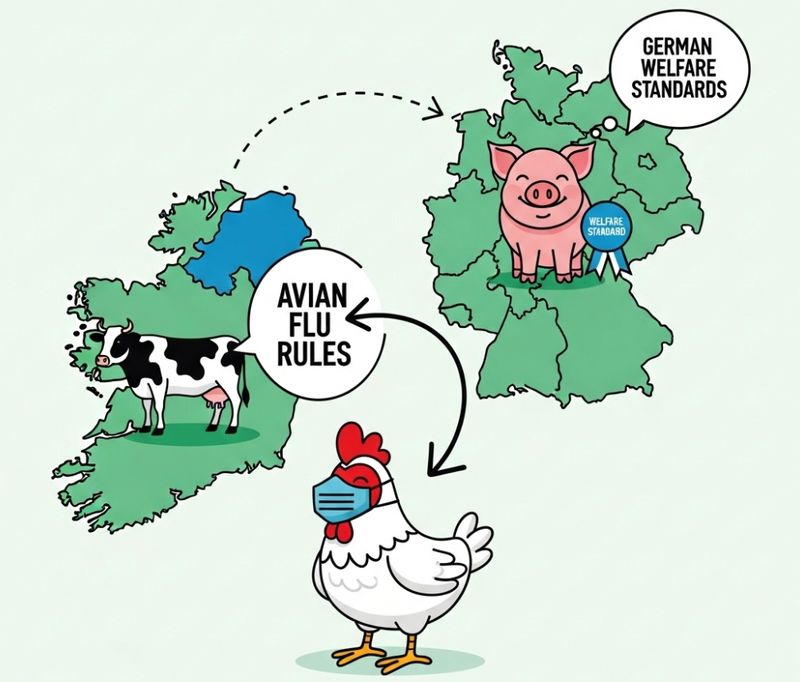
Published in News
Market Pulse: New Avian Flu Rules, Irish Beef's PGI Boost, and German Welfare Deadlines
The EU prepares new Avian Influenza vaccination rules, Irish Grass Fed Beef gains EU-wide protection, and a major German retailer accelerates its move to higher welfare standards.

Bo Pedersen
Chief Revenue Officer
EU Regulation: New Rules on Avian Flu Vaccination Nearing Finalisation
What happened: The European Commission is in the final stages of preparing new rules that will permit and regulate the use of vaccination against Highly Pathogenic Avian Influenza (HPAI) in poultry. The move is a major policy shift, driven by the unprecedented scale of HPAI outbreaks across the EU in recent years. The new rules will harmonise vaccination strategies and, crucially, set out trade conditions to ensure vaccinated poultry products can be safely moved between member states.
Why it matters: This is a potential game-changer in the fight against bird flu. While not a silver bullet, vaccination offers a vital new tool to reduce the risk of mass culls, protect animal welfare, and stabilise the poultry supply chain. The key challenge, which these new rules aim to solve, is ensuring that trade partners accept vaccinated products without imposing restrictions.
Implications & suggested actions:
Poultry Farmers: Vaccination could become a key part of your future biosecurity strategy. Stay in close contact with your vet and industry bodies to understand which vaccines will be approved and how the programmes will be implemented.
Processors & Exporters: These harmonised EU rules are essential for maintaining the single market. However, the next major hurdle will be securing acceptance from key non-EU trade partners. Engage with trade bodies to support efforts to get international agreement on this issue.
Retailers: A successful vaccination strategy will lead to a more resilient and stable poultry supply chain, reducing the risk of shortages and sudden price spikes. This is a positive development for ensuring consistent availability for your customers.
International Trade: 'Irish Grass Fed Beef' Awarded PGI Status
What happened: 'Irish Grass Fed Beef' has officially been awarded Protected Geographical Indication (PGI) status by the European Commission. The PGI is a legally protected mark that verifies the product is produced to a specific high standard in a designated geographical area. In this case, it certifies that the beef comes from cattle that have a diet of at least 90% grass and have spent a minimum of 220 days per year grazing on pasture.
Why it matters: This is a major marketing and branding victory for the Irish beef industry. The PGI status provides a unique selling proposition in crowded international markets, legally protecting the term from imitation and giving consumers a guaranteed mark of quality and authenticity. It allows Irish beef to be marketed as a premium product, similar to other famous European regional products.
Implications & suggested actions:
Irish Farmers & Processors: This is a powerful tool to add value to your product. Leverage the PGI status heavily in all marketing and branding communications. Ensure your production and traceability systems are robust to meet the strict verification requirements.
EU/UK Competitors: The success of the Irish PGI application raises the bar for everyone. It demonstrates the growing importance of provenance and verifiable production systems. Consider what unique attributes of your own national or regional production can be similarly protected and promoted.
Wholesalers, Retailers & Chefs: The PGI status provides a simple and legally protected way to assure your customers of the origin and quality of the Irish beef you sell. Use the PGI logo on menus and packaging to communicate this premium status and justify its price point.
German Retail: Lidl Accelerates Move to Higher Welfare Meat
What happened: German discount giant Lidl has announced it is accelerating its transition to higher animal welfare standards for its own-label fresh meat. The retailer has set a new target to have at least 50% of its fresh meat range sourced from the higher-welfare tiers 3 and 4 of the German "Haltungsform" scheme by 2026. The move is part of a wider strategy that includes a commitment to increasing the share of plant-based proteins.
Why it matters: When a retailer of Lidl's scale makes such a move in Europe's largest market, it sends a powerful signal to the entire supply chain. It effectively makes the higher tiers of the Haltungsform scheme the new benchmark for any producer wanting to do significant business in Germany. This puts immense pressure on farmers to invest in converting their systems and on processors to manage complex, segregated supply chains.
Implications & suggested actions:
German Farmers & Processors: The timeline for investment has now been shortened. This provides a clear business case for converting to higher welfare housing, but also a significant financial challenge. Engage with your retail partners to secure the long-term contracts needed to justify the investment.
EU Exporters to Germany: The bar for entry into the German market is rising fast. If you export fresh meat to Germany, you must now have a clear strategy for meeting these higher Haltungsform standards, or risk losing your position on the shelf.
Retailers (across EU): Lidl's move in Germany is a clear indicator of the direction of consumer and regulatory pressure. Review your own animal welfare targets and be prepared for increased scrutiny on the standards within your own supply chains.
Sources
EU prepares common rules for bird flu vaccination - Reuters (19 August 2025)
'Irish Grass Fed Beef' secures EU PGI status - Agriland (20 August 2025)
Lidl Germany sets new deadline for higher welfare fresh meat - Lebensmittel Praxis (19 August 2025)
